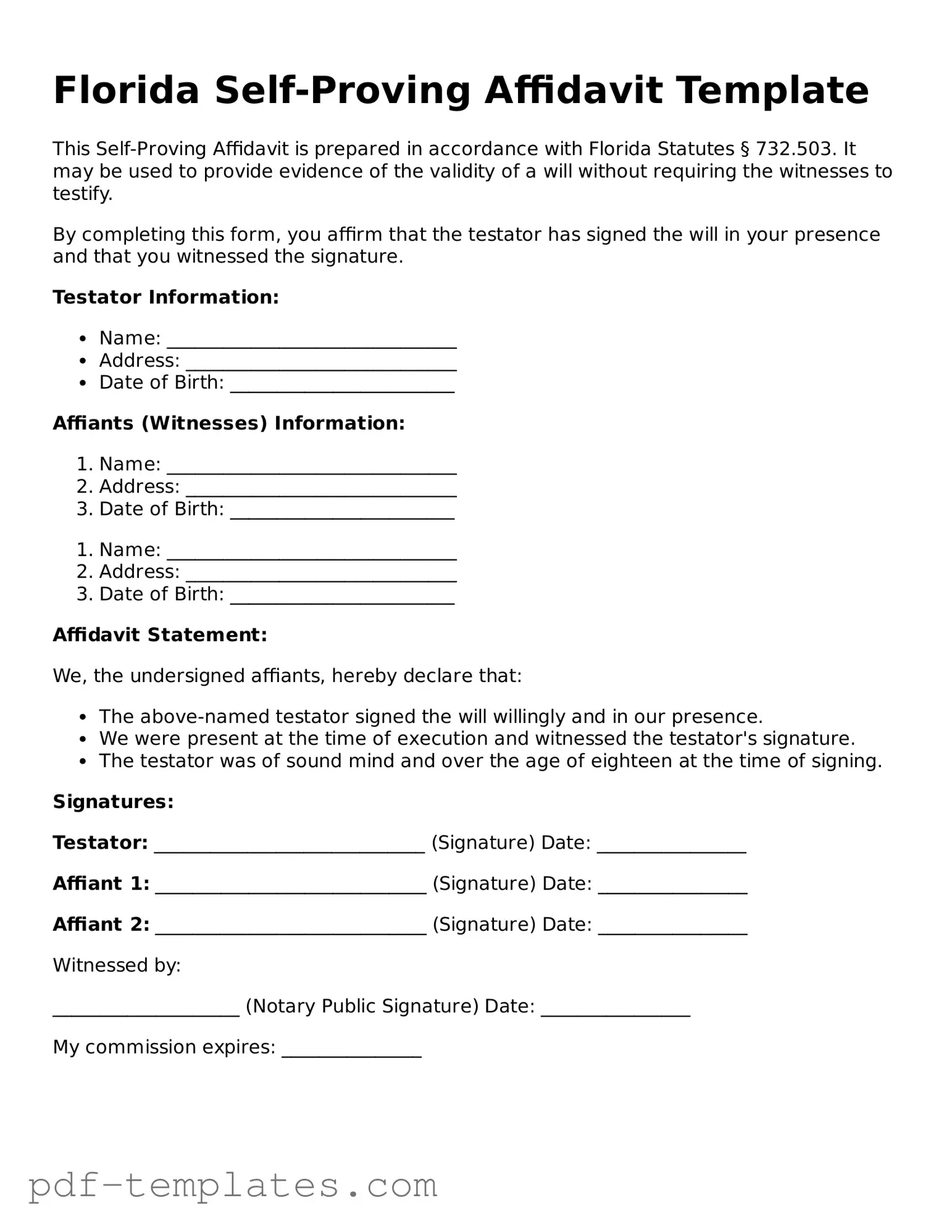The Florida Self-Proving Affidavit is similar to a standard will in that both documents serve to establish a person's final wishes regarding their estate. A will outlines how assets should be distributed after death, while a self-proving affidavit acts as a supplement to the will, providing evidence that the will was executed properly. This affidavit is signed by the testator and witnesses in front of a notary, which can help streamline the probate process by eliminating the need for witnesses to testify about the will's validity.
For those in Texas looking to facilitate the sale or purchase of a recreational vehicle, it's essential to have the proper documentation in place. The Texas RV Bill of Sale is a vital legal form that clearly outlines the transfer of ownership and protects both parties involved in the transaction. For more information and to access the form, you can visit https://documentonline.org/blank-texas-rv-bill-of-sale.
Another document that shares similarities with the Florida Self-Proving Affidavit is the Living Will. While a living will outlines a person’s healthcare preferences in case they become unable to communicate their wishes, it can also be accompanied by an affidavit to affirm its authenticity. Both documents require a clear expression of intent and must be signed in the presence of witnesses or a notary to ensure their validity, thereby providing peace of mind to the individual regarding their healthcare decisions.
The Durable Power of Attorney is yet another document that aligns closely with the self-proving affidavit. This legal instrument allows an individual to appoint someone else to make decisions on their behalf, particularly in financial or legal matters. Like the self-proving affidavit, a Durable Power of Attorney can be executed in front of witnesses and a notary, which adds a layer of protection against potential disputes regarding the authority granted to the agent. Both documents require careful consideration and proper execution to be effective.
The Affidavit of Heirship is also comparable to the Florida Self-Proving Affidavit. This document is often used to establish the heirs of a deceased person when there is no will. It is signed by individuals who have knowledge of the family history and can affirm the relationships. Similar to the self-proving affidavit, it serves to clarify intentions and validate claims, helping to simplify the process of estate distribution when disputes arise.
Additionally, the Revocation of Will is a document that serves a similar purpose in terms of affirming intentions. This document formally cancels a previously executed will, thereby preventing it from being used in probate. Like the self-proving affidavit, it should be executed with the appropriate formalities to ensure its effectiveness. Both documents are essential for managing one’s estate and ensuring that the most current wishes are honored.
The Codicil to a Will is another related document. A codicil is an amendment to an existing will, allowing individuals to make changes without drafting an entirely new document. Similar to the self-proving affidavit, a codicil must be executed with the same formalities as the original will, including signatures from the testator and witnesses. This ensures that the amendments are legally binding and recognized in probate proceedings.
The Affidavit of Witness is akin to the Florida Self-Proving Affidavit in that it serves to validate the execution of a will. This document is typically used when a witness to a will is unavailable to testify in court. By signing an affidavit, the witness affirms the circumstances under which the will was executed. Both documents aim to establish the authenticity of the will and protect the testator's intentions during the probate process.
Lastly, the Certification of Trust is similar in function to the self-proving affidavit, as it provides evidence of the existence and terms of a trust. This document can be used to verify that a trust is valid and to outline the powers of the trustee. Like the self-proving affidavit, it must be executed properly to ensure that it holds up in legal situations, particularly when dealing with financial institutions or other third parties.
